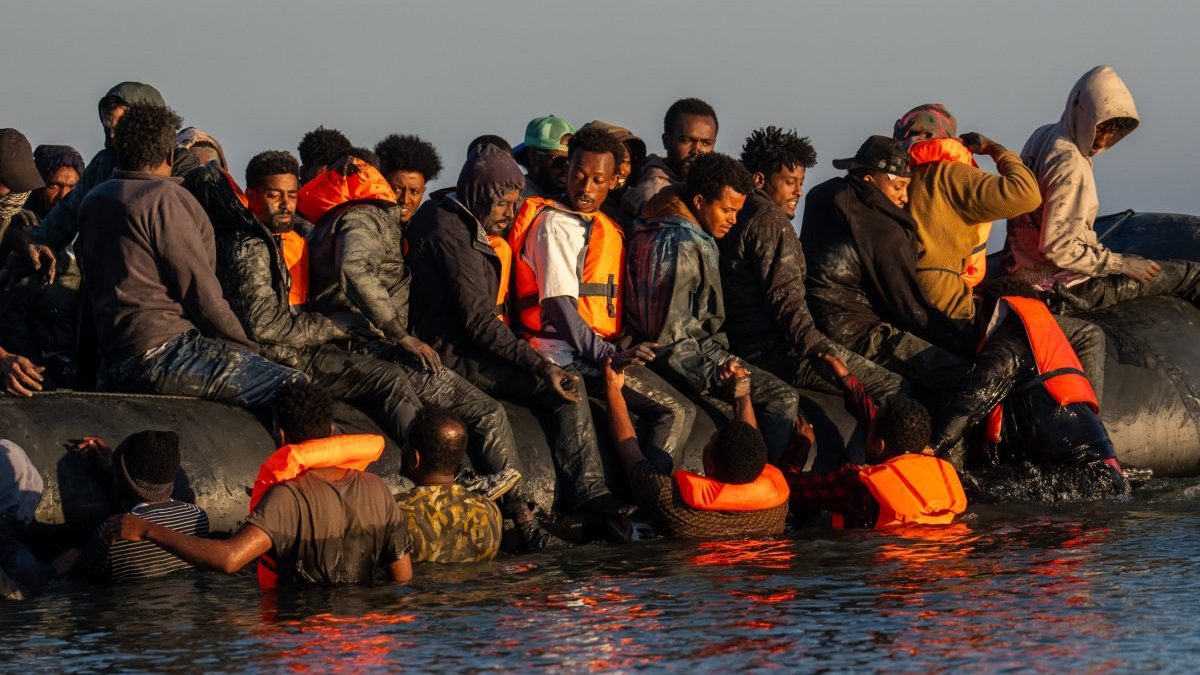At least 160,535 migrants have arrived in the UK by small boat since Brexit, compared with 10,608 between 2018 and 2020
Sir Keir Starmer has blamed Nigel Farage for the rise in illegal Channel crossings on what he described as “Farage boats”.
At the Labour Party conference in Liverpool, the Prime Minister claimed the UK’s migration crisis was down to the Reform leader’s campaign to leave the European Union in 2016.
He claimed leaving migrant return deals with 27 EU countries had caused the surge in small boat crossings since the UK left the bloc in 2020.
New FeatureIn ShortQuick Stories. Same trusted journalism.
Starmer told GB News: “I would gently point out to Nigel Farage and others that before we left the EU, we had a returns agreement with every country in the EU.
“He told the country it would make no difference if we left. He was wrong about that. These are Farage boats coming across the Channel.”
But is he right? Here, The i Paper takes a look at the figures and other factors that might have contributed to the rise in irregular migration to the UK since Brexit.
The figures
The UK narrowly voted to leave the EU in 2016 but did not withdraw from the bloc until four years later.
Between 2018 and 2020, the year the UK left the EU, 10,608 asylum seekers arrived in the UK by small boat, according to the Home Office.
That number soared to 28,526 the following year, reaching a peak of 45,755 in 2022 and falling to 29,437 in 2023.
Last year, 36,816 migrants arrived by small boat in total.
The Home Office figures show 19,982 made the perilous crossing between January and June in 2025, bringing the total arrivals to 160,535 since 2020.
Leaving the EU
Dr Peter Walsh, a senior researcher and lecturer at the University of Oxford’s Migration Observatory, suggested that the lack of a returns agreement with the EU could be to blame.
He said leaving the Dublin system, which allowed asylum seekers to be transferred to countries of first entry, could have created incentives for migrants to reach the UK.
This is because the UK left the European asylum fingerprints database, Eurodac, meaning migrants know the Home Office can’t tell if they have claimed asylum in another country.
“Otherwise, that would be a basis for a refusal and an attempt at removal. In a sense, it’s another bite of the cherry if you can get to the UK,” he said.
Earlier this year, Starmer struck a “one in, one out” migrant returns deal with French President Emmanuel Macron.
At least six migrants have been returned to France since the agreement came into force in September, but it is not yet clear if it will act as a deterrent.
Global conflict
More conflicts are currently taking place across the world than at any time since 1945 – the Institute for Economics and Peace (IEP) recorded 59 wars in more than 35 countries in 2024.
The war in Afghanistan – which displaced millions – came to an end in 2021, but fear of the Taliban only triggered further waves of migration.
Millions also fled Syria throughout the 14-year civil war which ended with the fall of Bashar al-Assad’s regime last year.
Sudanese people are reported to be the largest national group among migrants in Calais, as the war which began in 2023 rages on.
Lack of legal routes
In 2024, 99 per cent of those crossing the Channel sought asylum, meaning they requested refuge in the UK on the grounds of persecution or threat in their own country.
To claim asylum in the UK, a person must be physically in the UK. There is no visa to travel to the UK to make an asylum claim.
The UK does have some routes for other kinds of refugee resettlement in the UK – separate from the asylum process.
Most are nationality specific – for Afghans, Ukrainians and Hong Kongers – while some are run by the UN, but people cannot apply for these.
According to Oxford’s Migration Observatory, the current rules mean that people who do not have another form of visa – or are from the 67 countries that need visas to get to the UK – do not have a legal route to seek asylum in the UK.
Those who do not have access to a passport, either because they never had one or because it was lost or abandoned during the rush to flee their home, also cannot travel to the UK safely to seek asylum, the organisation said.
This leaves unofficial routes, such small boats, as their only option.
Labour’s immigration crackdown
Home Secretary Shabana Mahmood on Monday unveiled a series of new conditions for migrants who want to settle in the UK, including ensuring they learn English to a high standard, work, have a clean criminal record and volunteer in their community.
The time it takes to qualify for indefinite leave to remain will also be doubled from five to ten years under Mahmood’s proposals.
She is understood to be looking to apply the policy retrospectively to deal with concerns about the sharp increase in migration after Brexit.
It comes despite Starmer branding Farage’s plan to end the right to settle in the UK “racist” because it would see people who have lived in the country for decades deported.
